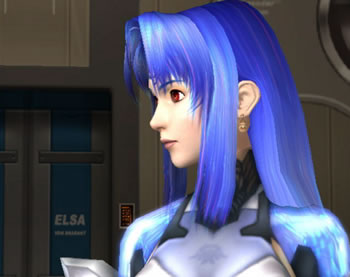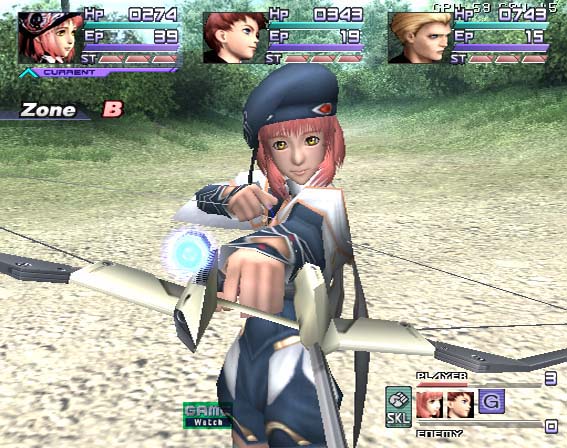|
|

|
BATTLE SYSTEM
|

|
INTERACTION
|

|
ORIGINALITY
|

|
STORY
|

|
MUSIC & SOUND
|

|
VISUALS
|

|
CHALLENGE
|
Hard
|
COMPLETION TIME
|
25-45 hrs.
|
|
OVERALL
3/5
|
Rating definitions
|
|
|
I concluded my review of Xenosaga Episode I: Der Wille zur Macht with this simple phrase: "I cannot wait for Episode II." This statement, even in its brevity, perfectly summarized my elation with everything about that game. Two long years later and Xenosaga Episode II: Jenseits von Gut und Bose is here; but I would have suffered to wait even longer if that would have made Episode II just a fraction more of the experience that Episode I was.
Now I'm not saying that this game is a bad RPG. But as a sequel to (in my opinion) one of the greatest RPG's of all time it fails dismally. This is directly related to a myriad of inexplicable design changes that the developers found necessary to make in order to change the very nature of the game itself. The initial example of these changes is in the graphics. In exchange for the more stylized visuals of the first episode they--namely, the characters--are more realistic. Now, the models display a broader sense of emotion than was possible in the anime-inspired prequel. The backgrounds are even more astounding in their detail, given the fact that you spend more time outside of deep space and space-ships in this game. And the cut-scenes are still some of the best in all of videogames.
Though there are some who are remiss at this change, it is indeed just a minor one; the music on the other hand is not. With the departure of famed maestro Yasunori Mitsuda (who composed Episode I and Xenogears) the new composer had some very large shoes to fill...and to some, those shoes cannot be filled by anybody. A listen to the soundtrack sadly affirms this belief. Another stylized mode of the prequel--no field music--has been excised. Now, being of the minority who actually approved of Episode I's silence, I do not believe the addition of ongoing field music is an improvement; especially when so much of the music is out of place or just plain bland. There are small glimmers of hope in the soundtrack, namely in the event scenes. [Just as a note, this game actually had two composers: Yuki Kajiura was mainly responsible for the event scenes and someone else was responsible for the field music. This explains the major discrepancies between the two]. Even the original voice cast has been replaced!
 Characters sport new looks in this entry.
Characters sport new looks in this entry.
|
|
With Episode II receiving both a graphical and aural facelift, one may wonder if the integrity of the game itself is still present. Thankfully the reason most people are attracted to this series--the story--is still deliciously complex and engrossing. However, given the shortened story arc of this game (you can beat the game comfortably in less than 30 hours!) the plot really only focuses on one main storyline. As a result some major elements of the first game, such as the Gnosis, really do not factor in so heavily (well, the Gnosis does...but their presence isn't felt like it was in Episode I). Character development is admittedly way ahead of most other games, but most characters not named Jr. don't really receive a sizeable amount until the last 30 minutes of the game. Lastly, several plot points are strangely unanswered (like *SLIGHT SPOILER ALERT* what are the Anima relics? and how did the party members obtain the ES units?); in stark opposition to the streamlined original.
Maybe if the database was still present that wouldn't have been a problem, though. Yes, the database that many spent hours paging through before has also been trashed. This is a very unfortunate chain of events because more than anything that was the developers' way of telling the gamer why certain things were the way they were. As a matter of fact, save the ability to return to previous areas the whole UMN feature has been removed; so that means no more E-mails, no more Casino, Mech Battling, or *sob* XenoCard! These have all been replaced by the Global Samaritan Campaign, were the player engages to help various NPC's in whatever way they can. The GS idea is actually a good one, and they do add a sense of immersion into Xenosaga's world: unfortunately due to poor implementation many of the campaigns amount to little more than glorified fetch quests that artificially inflate the length of the game.
 The battle system isn't necessarily an improvement.
The battle system isn't necessarily an improvement.
|
|
Now in regards to all of these changes mentioned up to now; if they were the end of them these are somewhat forgiveable and don't really represent a cataclysmic detriment to the gameplay itself. What does is the battle system. And this simultaneosly represents the biggest and worst change made to the Xenosaga franchise. The system now is more dependent on community attacks: everyone shares a common boost meter, there are double attacks, and characters can be switched in and out of battle a la Final Fantasy X. Almost all traces of individuality are sadly gone, only showing up in base stats and some special attacks. Characters now learn skills from a communal list that can be obtained with various Skill and Class points earned in battle. Characters can stock (save) attacks in battles and boost one after the other to unleash all of the attacks at once (much like in Xenogears and the combos). Some characters can knock enemies into the air or onto the ground for major damage. Too soon however battling resolves to an exercise in eating attacks in preparation for a huge assault, as this becomes the only viable way of doing any damage, even in random encounters (where the enemies could have several thousand HP!). What makes it even worse the enemy is doing the exact same thing you are doing, and--especially in the beginning--they are a lot better at it! This, along with a shortage of items (due to the absence of a monetary system) will lead to many characters being KO'ed in battle. I'm not saying that enemies should be dumb and random battles should all take place inside of a minute, but this amounts to a largely tedious and frustrating system--especially in character battles. The largely touted mech battles are a welcome change of pace and will bring back memories of Xenogears' Gear battles--even though to some they will undoubtedly grow to become very droll.
As much a shock and disappointment this is, in all honesty you really do not spend much time battling. Many of the 'dungeons' are surprisingly enemy-lite, and leveling up is really out of the question, except for probably in regards to the optional quests and areas that become available after completion of the game. So although this game is even harder than its prequel, that is artificially so.
Yes, Xenosaga Episode II will most likely disappoint you. Yes, it is basically self-depreciating in all of the changes it embraces. And yes, even, do I recommend that you play it. The things it does right don't necessarily cancel out everything it does wrong, but it more than makes playing the game worthwhile. Besides, this story is just too good to pass up, and becomes even more intriguing after the ending of this game. Hopefully Monolith Soft won't drop the ball like this on the next entry and in saying that, I cannot wait until Episode III!
Review Archives
|









